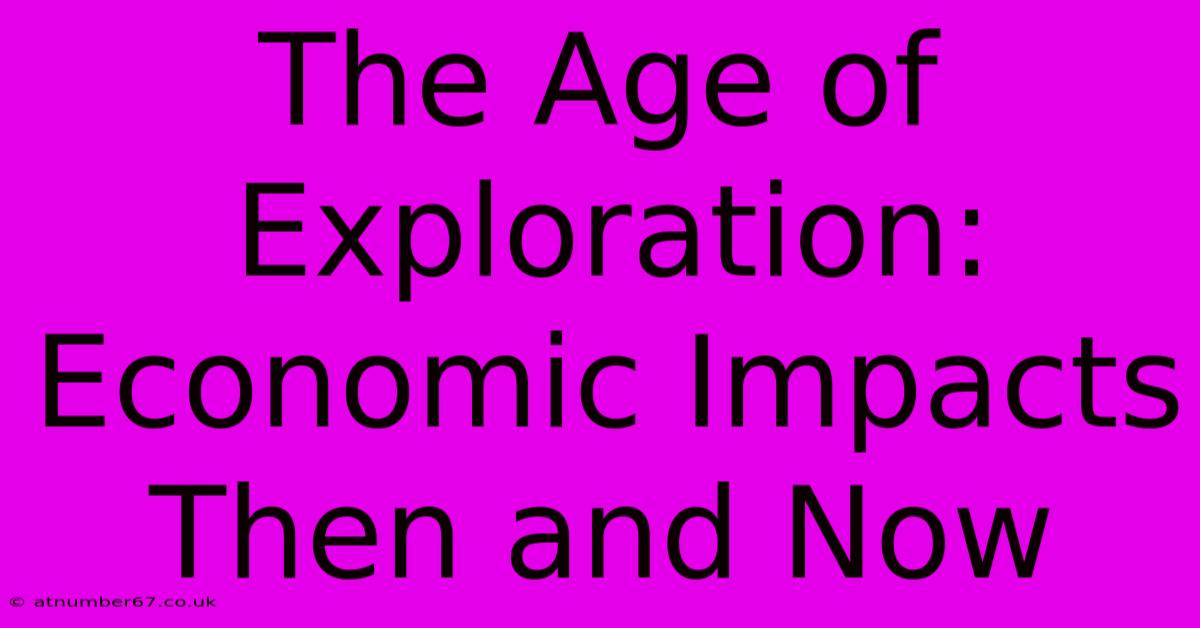The Age Of Exploration: Economic Impacts Then And Now

Table of Contents
The Age of Exploration: Economic Impacts Then and Now
The Age of Exploration, spanning roughly from the 15th to the 17th centuries, dramatically reshaped the global economic landscape. Driven by a desire for new trade routes, spices, and precious metals, European powers embarked on voyages of discovery that had profound and lasting consequences, influencing economic systems then and reverberating even into our modern world.
Economic Impacts Then: A Revolution in Trade and Global Power
The Age of Exploration fundamentally altered the existing economic order. Several key impacts stand out:
1. The Columbian Exchange:
This transatlantic exchange of goods, plants, animals, and diseases had a massive impact. Europeans gained access to New World crops like potatoes, tomatoes, and maize, boosting food supplies and population growth. Conversely, the introduction of European diseases decimated indigenous populations in the Americas, leading to significant demographic shifts. This exchange was not equitable; it fueled exploitation and created a new global economic hierarchy.
2. Mercantilism and Colonialism:
European nations adopted mercantilist policies, aiming to maximize their wealth through trade surpluses and the accumulation of gold and silver. Colonies became vital sources of raw materials and markets for finished goods, creating a system of dependency and exploitation. The extraction of resources from colonies, like silver from the Americas and spices from the East Indies, enriched European powers while impoverishing colonized regions.
3. The Rise of Global Trade Networks:
The Age of Exploration established new sea routes connecting Europe, Asia, Africa, and the Americas. This led to the development of vast global trade networks, facilitating the exchange of goods on an unprecedented scale. The growth of merchant capitalism and the emergence of powerful trading companies like the British East India Company transformed economic structures.
4. The Development of Financial Instruments:
To finance these ambitious voyages and burgeoning trade, new financial instruments emerged, including joint-stock companies and sophisticated banking systems. These innovations facilitated investment and risk-sharing, fueling further expansion.
Economic Impacts Now: A Legacy of Exploration
The consequences of the Age of Exploration continue to shape the global economy today.
1. Unequal Development:
The colonial legacy of exploitation and resource extraction created a deeply unequal distribution of wealth between nations. Many formerly colonized countries struggle with poverty, underdevelopment, and the lingering effects of historical injustices. This legacy is visible in global trade imbalances and persistent economic disparities.
2. Global Commodity Markets:
The commodities traded during the Age of Exploration – sugar, coffee, tea, spices – remain significant components of global commodity markets. The patterns of production and consumption established during this era continue to influence international trade relations.
3. Globalization and Interconnectedness:
The trade networks established during this era laid the groundwork for modern globalization. The interconnectedness of economies and societies is a direct descendant of the Age of Exploration's expansion of global trade routes.
4. Cultural and Linguistic Diversity:
The Age of Exploration resulted in significant cultural exchange and diffusion. The languages, religions, and cultural practices of Europe spread across the globe, while also leading to the hybridization and transformation of existing cultures.
Conclusion: A Complex and Enduring Legacy
The Age of Exploration was a period of immense transformation, bringing both progress and devastation. While it spurred economic growth and innovation, it also fostered exploitation, inequality, and lasting economic disparities. Understanding its impact, both then and now, is crucial for analyzing our current global economic system and working towards a more just and equitable future. The shadows of colonialism and the uneven distribution of wealth created during this era continue to cast a long shadow on the world's economic stage, reminding us of the importance of acknowledging the complexities of history and striving for a more balanced and sustainable global economic order.

Thank you for visiting our website wich cover about The Age Of Exploration: Economic Impacts Then And Now. We hope the information provided has been useful to you. Feel free to contact us if you have any questions or need further assistance. See you next time and dont miss to bookmark.
Featured Posts
-
Brian Littrells Son The American Idol Cinderella Story
Apr 04, 2025
-
The Surprising Truth About Nischal Jain Dharmasthalas Age
Apr 04, 2025
-
Santner Age Embrace The Possibilities
Apr 04, 2025
-
Time In Nuevo Laredo Easy To Check
Apr 04, 2025
-
Safer Structures Preventing Future Earthquake Damage
Apr 04, 2025
